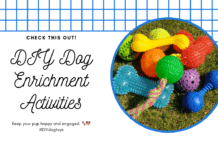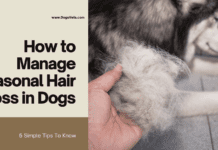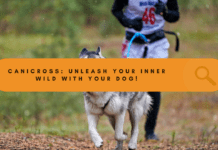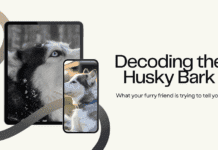Last Updated on April 4, 2024 by Dogs Vets
Trimming a dog’s nails safely involves using proper tools, avoiding the quick, and staying calm. Start by desensitizing your dog to nail trimming, then use a sharp clipper to cut the nail at a slight angle.
Check for the quick before you begin, and make slow, steady cuts to avoid accidents. Reward your dog for good behavior and stop if they become anxious. Regular nail trims are important for your dog’s health and comfort, so take the time to do it properly to avoid any issues.
By following these steps and practicing patience, you can safely trim your dog’s nails at home.
Preparing Your Dog
Dogs can be sensitive when it comes to having their nails trimmed. To ensure a successful and stress-free grooming session, it’s important to prepare your dog both mentally and physically.
Taking the time to familiarize your furry friend with the nail trimming process and creating a calm environment can make all the difference. Below, we’ll explore how to recognize signs of stress and introduce your dog to nail trimming, setting them up for a positive experience.
Recognizing Signs Of Stress
Knowing how to recognize signs of stress in your dog is crucial before starting the nail trimming process. By understanding their body language, you can gauge if they are comfortable or anxious. Some common signs of stress in dogs include:
- Panting excessively
- Whining or growling
- Pulling away or hiding
- Showing signs of aggression
- Trembling or shaking
- Dilated pupils or wide-eyed expression
Should you notice any of these signs, it’s important to take a step back and give your dog some time to calm down before attempting to trim their nails. Patience and understanding are key.
Introducing Your Dog To Nail Trimming
Introducing your dog to nail trimming gradually can help alleviate their fear and make the process smoother. Below are some steps to follow:
- Start by getting your dog used to having their paws touched gently. Reward them with praise and treats to create a positive association.
- Once your dog is comfortable with paw handling, introduce the sound of the nail trimmer or grinder. Let them sniff it and associate it with positive experiences.
- Next, practice the motion of trimming without actually cutting the nails. This will allow your dog to get accustomed to the sensation.
- Gradually introduce the nail trimmer or grinder and make small, gradual cuts. Reward your dog with treats and praise each time to reinforce positive behavior.
Remember, consistency is key. By following these steps and ensuring your dog feels comfortable and safe throughout the process, you are setting them up for successful nail trimming sessions in the future.
Choosing The Right Tools
When it comes to trimming your dog’s nails, choosing the right tools is essential to ensure a safe and comfortable experience for both you and your furry friend.
With the proper tools, you can effectively trim your dog’s nails without causing any discomfort or injury. Let’s explore the types of nail clippers and other tools you can use for nail trimming.
Types Of Nail Clippers
There are several types of nail clippers available for trimming a dog’s nails. The most common options include:
- Guillotine Clippers: These clippers feature a hole where the dog’s nail is inserted, and a blade slices through the nail when the handles are squeezed.
- Scissor Clippers: These clippers resemble scissors and are suitable for dogs with thicker nails.
- Grinder Tools: Electric or battery-operated grinders can be used to file down the nails to the desired length. They are particularly useful for dogs with dark nails where it’s challenging to see the quick.
Other Tools For Nail Trimming
In addition to nail clippers, there are other tools that can aid in the nail trimming process:
- Nail File: A nail file can be used to smooth any rough edges after trimming the nails or to gradually shorten the nails for dogs who are sensitive to clippers.
- Styptic Powder: In case of accidental bleeding, styptic powder can help stop the bleeding quickly.
- Scratch Pad: Placing a scratch pad near your dog’s favorite resting spot can help naturally wear down the nails.
Trimming Techniques
Trimming Techniques:
Proper nail length and addressing bent dog nails are crucial aspects of safely trimming your furry friend’s nails.
Proper Nail Length
Trimming dog nails to the correct length is essential to maintain their overall paw health.
- Regularly check the nails for overgrowth.
- Clip the white portion of the nail, avoiding the quick.
- Use a sharp nail trimmer for a clean cut.
What To Do If Dog Nail Bent 90 Degrees?
If your dog nail bent 90 degrees, causing discomfort, it’s important to address it promptly:
- Do not attempt to bend the nail back.
- Consult a veterinarian for appropriate treatment.
- Prevent further damage by keeping the nail clean.
Handling Challenges
Discover the safest way to trim your dog’s nails with this complete guide. Learn invaluable tips and techniques to handle this challenge effortlessly in 2024.
Dealing With Fear Or Anxiety
Begin by creating a calming environment for your dog, using gentle tones and soothing movements to help alleviate anxiety.
What To Do If You Accidentally Cut The Quick
Apply styptic powder to stop bleeding, and reassure your dog with comforting gestures to reduce stress.
Aftercare
Learn how to safely trim your dog’s nails with our comprehensive guide for 2024. Discover step-by-step instructions to ensure your furry friend’s comfort and safety during the process. Plus, find valuable tips and aftercare techniques to keep your dog happy and healthy after a successful nail trim.
After completing the nail clipping process, it’s essential to consider effective aftercare for your dog to ensure they stay comfortable and calm.
Rewarding Your Dog
After the nail trimming session, make sure to reward your dog with treats, cuddles, and praise. This positive reinforcement will help them associate the experience with positivity and reduce their anxiety in the future.
Monitoring for Any Discomfort
Keep an eye on your dog’s behavior after the nail trim. Look for signs of discomfort such as limping, licking their paws excessively, and reluctance to walk. If you notice any of these behaviors, consult your veterinarian immediately.
Ensuring your dog is comfortable and calm following a nail trimming session is crucial for their well-being. By incorporating these aftercare practices, you can ensure that your furry friend remains content and relaxed after their nail trimming experience.
Professional Help
While trimming your dog’s nails at home can be a convenient option, it’s important to know when to seek professional help. There may be instances where you need the expertise of a veterinarian or groomer to ensure a safe and stress-free nail trimming experience for your furry friend.
When To Seek A Vet Or Groomer
There are certain situations where it is highly recommended to reach out to a vet or groomer for assistance with your dog’s nail trimming:
- If your dog has black nails and you are unsure about the quick, the sensitive area inside the nail containing blood vessels and nerves. A professional can accurately determine the right length to avoid causing pain or injury.
- If your dog becomes extremely anxious or aggressive during the nail trimming process, it could be challenging to safely trim their nails at home. A professional can use their experience and calming techniques to ensure a stress-free and successful nail trim.
- If you have tried trimming your dog’s nails but are unable to achieve the desired results. Some dogs have thick or overgrown nails that may require specialized tools or techniques that professionals have access to.
- If you notice any abnormalities or issues with your dog’s nails, such as excessive bleeding, swelling, or signs of infection. Seeking professional help in such cases can prevent further complications and ensure proper treatment.
Benefits Of Professional Nail Trimming
Choosing professional help for your dog’s nail trimming comes with several benefits:
- Expertise and Experience: Veterinary professionals and groomers are trained to handle various breeds and temperaments, making them more knowledgeable in handling different dogs during nail trims.
- Precision: Professionals can accurately identify the appropriate length to trim your dog’s nails, minimizing the risk of causing pain or injury.
- Specialized Tools: Vets and groomers have access to specialized tools that may be necessary for dogs with difficult or overgrown nails, ensuring a smoother and safer process.
- Reduced Stress: Professionals are skilled in creating a calm and relaxed environment, alleviating your dog’s anxiety and making the entire nail trimming experience less stressful for both you and your furry companion.
- Preventative Care: Regular visits to professionals for nail trims allow them to monitor your dog’s overall nail health, prevent complications, and address any underlying issues promptly.
Seeking professional help when needed ensures that your dog’s nails are trimmed properly, keeping them healthy and reducing the risk of discomfort or injury. Remember, the well-being of your furry friend should always be a top priority!
Conclusion
As you now have a comprehensive understanding of how to safely trim your dog’s nails, you can confidently maintain their paw health. By following the guidelines and tips provided, you can ensure a stress-free experience for both you and your furry friend.
With patience and practice, you’ll become adept at this essential aspect of pet care.
Fact Check
We strive to provide the latest valuable information for pet lovers with accuracy and fairness. If you would like to add to this post or advertise with us, don’t hesitate to reach us. If you see something that doesn’t look right, contact us!























